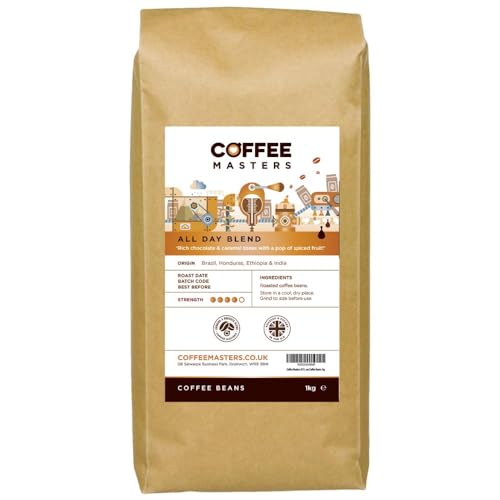Why Is Everyone Talking About Coffee Bean Right Now
Kellee
0
4
15:00
 What Are Coffee Beans?
What Are Coffee Beans? The coffee beans that you brew are actually the seeds of a fruit called a coffee cherry. The coffee plant is perennial plant, which means that it comes back every year.
The coffee beans that you brew are actually the seeds of a fruit called a coffee cherry. The coffee plant is perennial plant, which means that it comes back every year.Consuming coffee beans in moderation is recommended because they are high in caffeine and other substances. Learn more about this well-known seed!
Origin
Coffee is a beverage made from the seeds that have been roasted (beans) of the coffee plant. The beans are one of the most well-known and lucrative commodities in the world. The coffee plants are evergreen, woody plants that thrive in tropical climates. The Bean Belt includes the areas close to the Tropic of Cancer, and the Tropic of Capricorn.
The most popular story about the origin of coffee begins in Ethiopia with a goatherder named Kaldi. He noticed that the bright red berries from certain coffee plants helped his goats become more energetic. Kaldi shared his discovery with the abbot of a nearby monastery who came up with a drink made from the berries. The energizing effects of the berries were then spread to other places.
Presently, coffee beans are produced by two main varieties of Coffea plants: Arabica and Robusta. Robusta is mostly in Africa and Indonesia, and is usually less expensive than arabica. Apart from the major varieties, there are a variety of smaller, specialty beans that are a blend of arabica and robusta. These beans are referred to as Peaberries and have a scrumptier taste than regular beans.
In the process of roasting, beans lose their moisture which can result in them becoming bitter and stale. It is essential to make use of fresh, high-quality beans for your coffee.
Flavor
The bean's variety, climate and processing method can affect the four elements of taste, which are acidity and bitterness as well as sweetness and saltiness. The degree of these elements can create a wide range of flavors that range from fruity and sweet to nutty, or even smoky.
When coffee beans are exposed to heat they react with amino acids within the seeds, resulting in hundreds of aromatic compounds that influence the flavor profile. This reaction is known as the Maillard Reaction, and it occurs in virtually all cooking. The aroma of beans cooked reflect these compounds.
The Maillard Reaction is responsible for the overall flavor, but volatile and nonvolatile components also contribute to the taste of coffee. Green beans, whether unroasted or not, can be a bit sweet, floral or earthy. Bitterness is often due to roasts with a full body that contain more caffeine, but it could also be due to poor brewing methods or storage.
Flavored coffee beans are coated with flavor oils that aid in preserve the beans, while also adding a specific aroma and taste. These flavor oils are a combination of natural and chemical flavors that range from cinnamon to vanilla chocolate. The flavors are linked to the beans with an organic compound known as polyphenol.
Health Benefits
Coffee beans are a rich source of a variety of health-boosting nutrients, such as magnesium, potassium and B vitamins. They also provide a wealth of antioxidants, which help to prevent the oxidative stress (which causes chronic diseases such as cancer and atherosclerosis). The antioxidants found in the chlorogenic acids in coffee beans are especially effective against obesity-related diseases, such as diabetes or high cholesterol levels.
Coffee is a natural energy booster that helps people feel more alert. Caffeine stimulates neurochemicals, which improves alertness, memory and cognitive performance. It also helps regulate blood sugar levels. Consuming moderate amounts of coffee has been proven to decrease the risk of developing Parkinson's disease and dementia. It also boosts happiness, mood, energy, and concentration.
Anti-aging: The antioxidants in coffee (including caffeine and chlorogenic acids) are natural moisturizers for skin that increases cell turnover, as well as diminishing the appearance of wrinkles and fine lines. They also possess UV-protection capabilities that block light and prevent sun damage to skin.
Anti-depressant coffee beans delivery beans are a natural antidepressant. They boost serotonin levels as well as dopamine levels in the brain, which increases the levels of happy hormones. It can also ease pain and inflammation, acting as a natural sedative and improving the effectiveness of medical painkillers. coffee bean company also contains cafestol and Kahweol, two diterpene ester with lipolytic properties within the adipose tissues, helping to fight cellulite.
Caffeine
bulk buy coffee beans is a popular drink throughout the world. It is now an integral part of most morning routines. Coffee beans are the seeds of the coffee plant or top Rated Coffee Beans cherry. They contain caffeine, a natural stimulant. The caffeine in coffee can vary based on how the bean is made, roasted, and brewed. However, there are fundamental rules regarding the amount of caffeine in each coffee bean that can assist you in making the right choices when selecting your joe.
The average coffee bean is around 2 milligrams of caffeine. However the exact amount could depend on the size and how darkly it was roasted. There is a widespread misconception that coffee beans with darker roasts contain more caffeine than lighter roasted ones. This is not true. A dark roast coffee bean is likely to have less caffeine than a light roast due to its lower density, but the overall amount of caffeine will be similar.
The recommended daily limit for caffeine is 400 milligrams. A typical cup of coffee has 95 milligrams. Keeping within this range should not cause any negative unwanted effects unless sensitive to caffeine. Caffeine does not cause harm to those who aren't. However it is essential to keep track of how much caffeine you consume and be cautious about overdoing.
